What to Declutter Every Week, Every Month, and Every Year
Consistent decluttering here and there makes for a much less overwhelming spring cleaning.
Whether you live in a large home or a studio apartment, clutter can easily build up. Sometimes it’s a kitchen countertop or the desk in your home office. We all leave things out and say we’ll take care of it tomorrow, then end up pushing that day back again and again. As a result, messes accumulate and our homes become the sources of headaches, not peace.
While diving in all at once can feel overwhelming, scheduling key areas to declutter regularly can be a more efficient way to tackle messes. So, where do you start? Here are the spaces that professional organizers recommend decluttering weekly, monthly, and yearly.
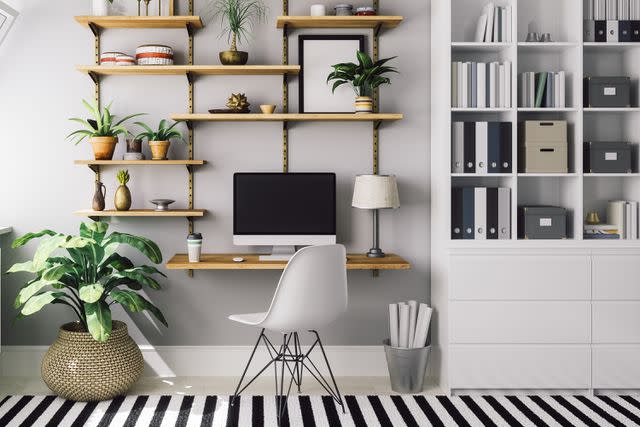
Imaginima/Getty Images
Related: How to Declutter Every Room in Your Home—Fast
What to Declutter Every Week
Countertops
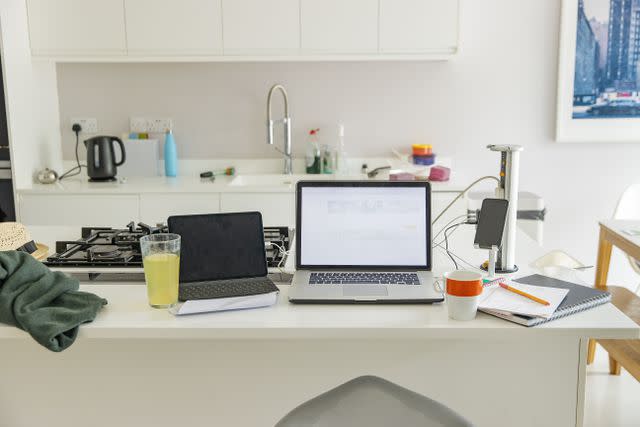
Justin Paget/Getty Images
We’ve all been there. It’s been a long day and we end up throwing a stack of mail on the kitchen countertop, leave out those empty pizza boxes we’re not quite ready to break down, or pile up reusable grocery bags after unloading the groceries. Things start to look messy quickly, particularly in open-concept homes.
Jennifer Jarrett, professional organizer and founder of Jenuinely Contained, recommends decluttering countertops weekly. “Any flat surface is fair game for putting crap down on," she says. "Don't know where to put that stack of mail that built up while you were away? A flat surface. Unsure where to put all the artwork your kids bring home from school every day? Any flat surface. It can be a convenient and quick solution, but if it isn't kept in check, it's fast to get cluttered.”
At the end of each week, Jarrett walks through the common areas of her home with a “put-back basket” and collects items that have landed in the wrong place. “Once I've cleared off the countertops I redistribute the items to their proper location," she explains. "Crumpled wrappers, trash. Random belt, kids' room. Lip gloss, my purse, etc.”
Refrigerator
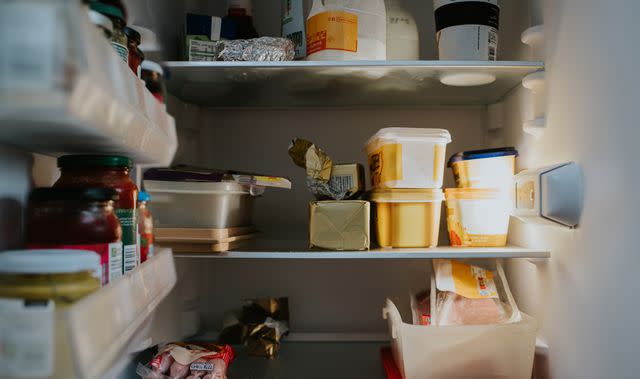
Catherine Falls Commercial/Getty Images
The refrigerator should also be decluttered every week, Jarrett explains. If you go grocery shopping once a week, then ideally, you would declutter the fridge before making the trip to the store. Start by throwing away anything past its prime. Not sure? Refer to this food expiration dates guide to see if you should keep or toss those questionable items in your fridge.
Finally, make a mental note of anything that’s not expired but definitely needs to be eaten in the upcoming days before it spoils. “Move those items to the front of the fridge and work them into your upcoming meal plan," Ashley Murphy, professional organizer and co-founder of NEAT Method, says. "Sort the remaining items into categories and contain them in individual drawers, bins, or shelves. Add removable labels to each zone to keep everyone in your home on the same page. Don’t forget to leave a spot for leftovers."
Junk Mail
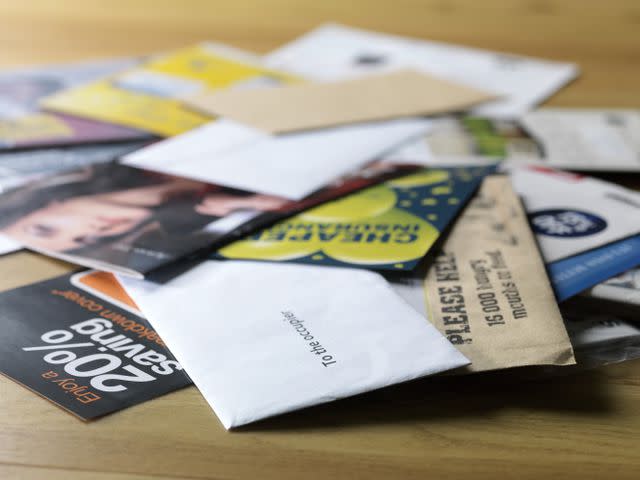
TEK IMAGE/Getty Images
In a perfect world, you'd toss junk mail ASAP after checking your mailbox at the end of the day, but many of us are guilty of letting it pile up. Once a week is a more realistic goal for most folks: Aim to sort through and recycle your mail, then go paperless—and digital—when you can.
Related: Organize Your Mail Clutter By Avoiding These 7 Mistakes
Purses, Handbags, and Bookbags
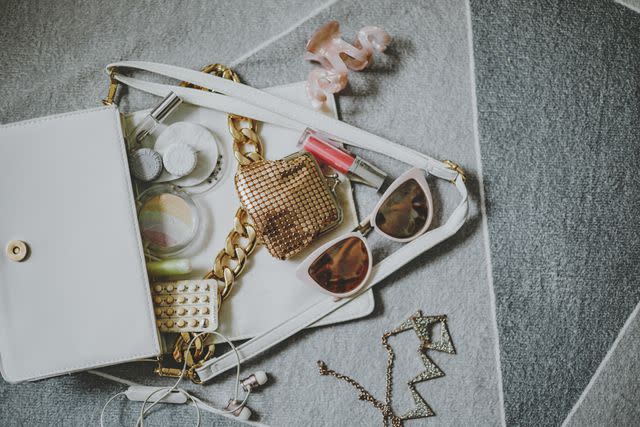
Carol Yepes/Getty Images
"Carefully consider your needs and think about your purse as something that should only be used for necessities, not a carry-all," recommends Ann Lightfoot, co-founder of Done and Done Home. Put items such as your keys, headphones, or wallet in a bright pouch to ensure you have everything you need when switching bags. Trash receipts and gum wrappers and remove anything unnecessary like old makeup and medications.
Monthly
Pantry
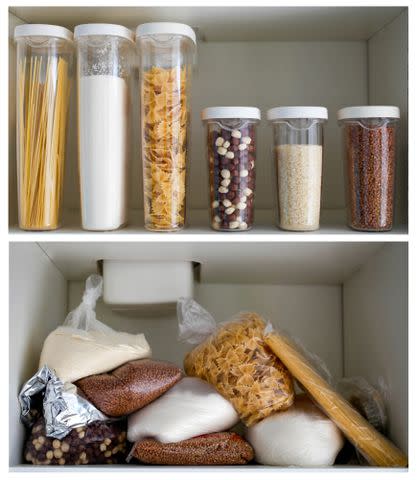
Irina Tiumentseva/Getty Images
Pantry items tend to last a little longer than refrigerated items, Jarrett explains, so those only need decluttered once a month. She suggests checking for expired or stale items and tossing them. “Make sure that all other items are securely closed," she says. "Chip clips are the best for this. It is also a good time to get rid of those impulse-buy items that never gained traction, such as that dill pickle popcorn that nobody liked, or those baked lentil potato chips that tasted like cardboard.”
Then, Jarrett recommends grouping similar items together—chips with chips, pasta with pasta, nuts with nuts, etc.
To avoid losing track in the future as well as to prevent food waste, Murphy suggests implementing a riser for a better visual of canned goods and storing categorized condiments onto turntables. “Transparent canisters are perfect for storing staples at eye level so you can keep an eye on [what you have in] stock," Murphy says. "Lastly, corral remaining categories into labeled bins and baskets.”
Related: The 19 Best Kitchen Cabinet Organizers for Every Storage Need
Freezer
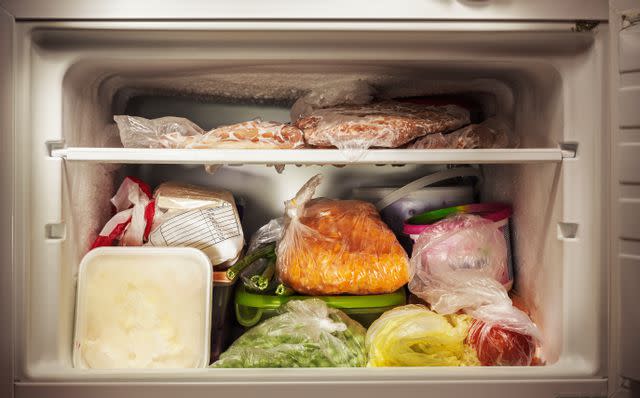
dejankrsmanovic/Getty Images
Just like in your pantry, foods last longer in the freezer than they do in the fridge, so it's not necessary to declutter items on a weekly basis. However, what tends to happen with freezers is they become a dumping ground for food people don't want to toss but also never plan to truly eat. Go through your freezer shelves and bins monthly—this will help remind you of what's still in there and needs to get cooked. But be realistic with yourself, too, and toss anything you know you'll never get to.
Medicine Cabinet
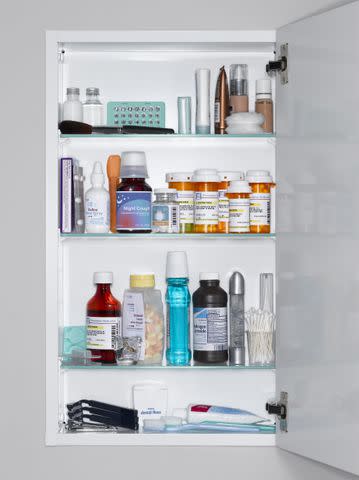
Don Farrall/Getty Images
You can technically stretch this out a few months (at least every six months), but many items in your medicine cabinet expire. Because everything has varying expiration dates, it's wise to check everything once a month to make sure it's all up to date. And make sure you're storing the right things in the medicine cabinet, like your toothbrush and first aid kit, not medicine and perfumes.
Car
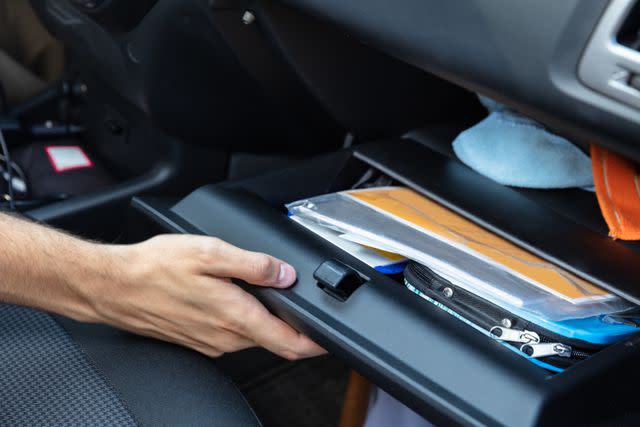
AndreyPopov/Getty Images
Cars are kind of like portable dumpsters for some people! They quickly get junky. Clean it out monthly and remove food wrappers and empty water bottles. Don't forget the glove box—it should only contain important things like your insurance card, registration, and manual. Go through your trunk too. It's okay to keep some essentials in this space though, such as reusable grocery bags, jumper cables, and a few extra bottles of water.
Yearly
Closet
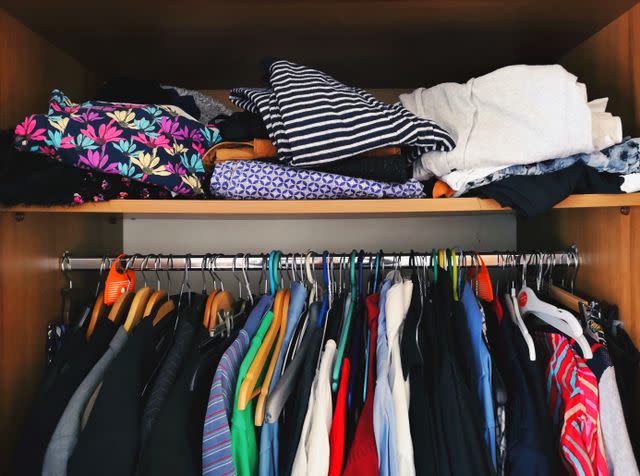
Annie Japaud/Getty Images
While the co-founders of NEAT Method recommend cleaning out your closet seasonally, Jarrett advises doing one big closet clean out yearly. “For this area, you want to pull everything out. Yes, everything," Jarrett says. "If you have a rolling clothes rack this is often very helpful to put all of your hanging clothes onto while you sort through them. If there are space constraints, this area can also be done in sections.”
NEAT Method co-founder Marissa Hagmeyer suggests considering letting go of any items you haven’t worn in the past six months. “Set them aside for donation," she says. "It’s also a good time to pass on items that no longer fit, are stained, or have seen better days. Don’t be afraid to send pictures to an honest friend for their opinion on pieces that you’re on the fence about.”
Paperwork

Jose A. Bernat Bacete/Getty Images
Files and other paperwork, like credit card statements—if you still get them in the mail—are also things that should be decluttered annually. “Following tax season is a good time to give files a glance to see if there are any items you’re holding onto unnecessarily," Hagmeyer says. “If you don’t already have a file system in place, we suggest sorting them by category and using hanging file folders within an office drawer or modular box. Align the tabs in a straight row and alphabetize for an easy visual.”
Toys
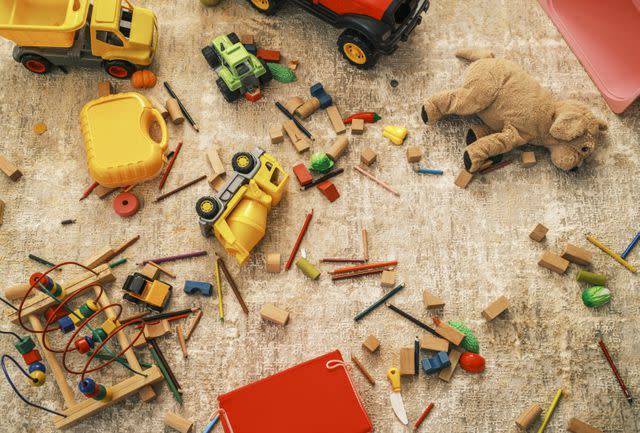
ozgurdonmaz/getty images
If you have young children, toys can be a major source of clutter and frustration. So, every time a birthday comes around, it’s time to get rid of some things. “Depending on your child’s age, you may or may not want to include them in the process of making those decisions," Hagmeyer says. "Set aside anything that is no longer age-appropriate, as well as anything they haven’t played with in the past four months. Or, consider collecting less often played-with toys in a bin and cycling them out every few months. If, when you bring the old toys back, your child still shows no interest you can safely say goodbye."
Holiday Decorations

Xanya69/Getty Images
Before you box up garlands, ornaments, and menorahs and store them away after the holidays, evaluate your stash. If there are decorations you haven't used or ones that are damaged, it may be time to toss them. Next, choose holiday decor storage solutions and put them to work.
Linens
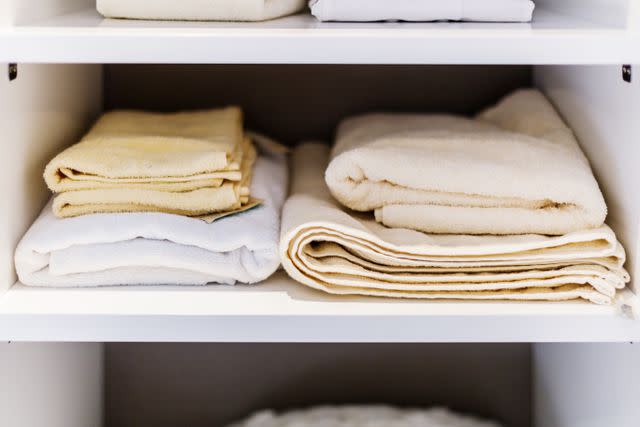
whyframestudio/Getty images
Sheets and towels easily accumulate and it might be because most people don't know what to do with them once they're old. Separate worn-out towels, sheets, and bedding you no longer use. Fold and organize what's left so that it is easy to see and use, then donate the towels and bedding to a local animal shelter.
Books

© eleonora galli/Getty images
For many people, books are incredibly difficult to let go of. They become emotionally attached to titles, and for some folks, books are their entire personality! But once a year, sort through your collection. Start by dividing reads into three piles: books you want to keep, books you want to donate, and books that could be repurposed for styling around your home (anything with a pretty, colorful spine is often useful for filling open shelving, even if you don't necessarily reread it).
Keep anything that has a sentimental inscription, priceless vintage finds, and favorites that you love to read again and again. If dropping a box of your well-loved novels in a donation bin feels too impersonal, purchase a little free library instead. You can set it up outside your home to give neighbors and local book-lovers a chance to "shop" your shelves—plus, you never know what new favorites may be awaiting you inside, left by others.
Cosmetics
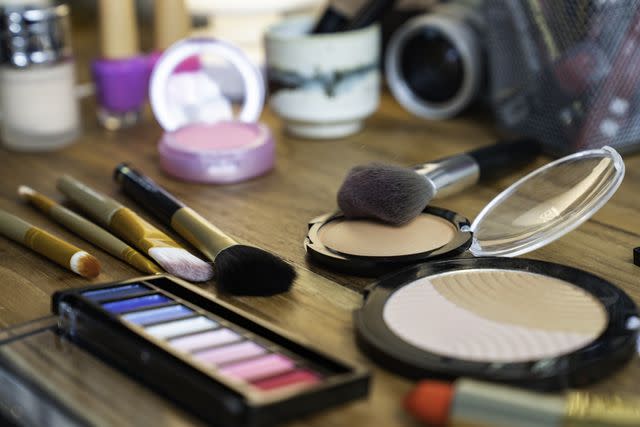
Songsak rohprasit/Getty Images
Makeup and skincare can also expire! In general most things last a year after opening, but there are a few exceptions, so it's helpful to familiarize yourself with those dates with our helpful guide. Toss anything you haven't touched in months and don't see yourself using ever again. If it pains you to toss something that was pricey, consider passing it along to a family member or friend.
Cups, Water Bottles, and Mugs
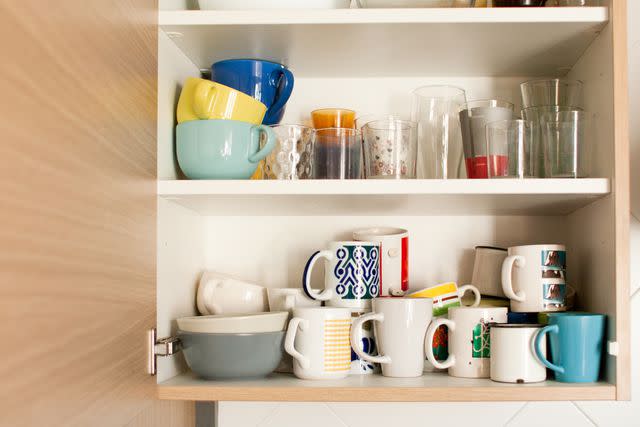
Os Tartarouchos/Getty Images
Newsflash: You don't need that many plastic cups, mismatched coffee mugs, and water bottles. If you see a group of them collecting dust in your kitchen cabinets, pack them up and donate them to Housing works.
Related: 5 Simple Decluttering Strategies to Make Letting Go of Items Easier
For more Real Simple news, make sure to sign up for our newsletter!
Read the original article on Real Simple.

